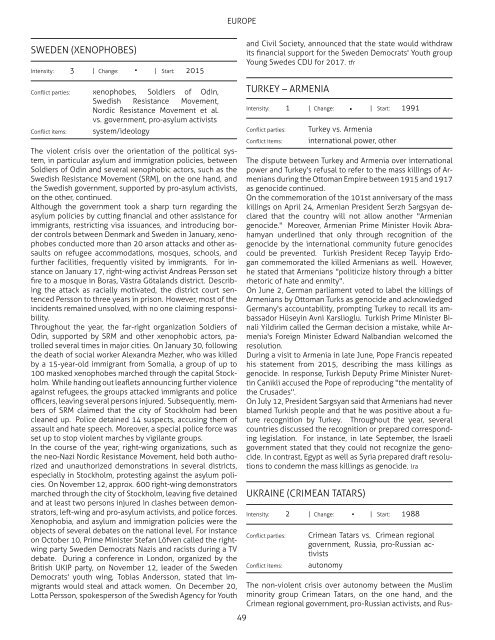ConflictBarometer_2016
ConflictBarometer_2016
ConflictBarometer_2016
You also want an ePaper? Increase the reach of your titles
YUMPU automatically turns print PDFs into web optimized ePapers that Google loves.
EUROPE<br />
SWEDEN (XENOPHOBES)<br />
Intensity: 3 | Change: | Start: 2015<br />
and Civil Society, announced that the state would withdraw<br />
its financial support for the Sweden Democrats' Youth group<br />
Young Swedes CDU for 2017. tfr<br />
Conflict parties: xenophobes, Soldiers of Odin,<br />
Swedish Resistance Movement,<br />
Nordic Resistance Movement et al.<br />
vs. government, pro-asylum activists<br />
Conflict items:<br />
system/ideology<br />
The violent crisis over the orientation of the political system,<br />
in particular asylum and immigration policies, between<br />
Soldiers of Odin and several xenophobic actors, such as the<br />
Swedish Resistance Movement (SRM), on the one hand, and<br />
the Swedish government, supported by pro-asylum activists,<br />
on the other, continued.<br />
Although the government took a sharp turn regarding the<br />
asylum policies by cutting financial and other assistance for<br />
immigrants, restricting visa issuances, and introducing border<br />
controls between Denmark and Sweden in January, xenophobes<br />
conducted more than 20 arson attacks and other assaults<br />
on refugee accommodations, mosques, schools, and<br />
further facilities, frequently visited by immigrants. For instance<br />
on January 17, right-wing activist Andreas Persson set<br />
fire to a mosque in Boras, Västra Götalands district. Describing<br />
the attack as racially motivated, the district court sentenced<br />
Persson to three years in prison. However, most of the<br />
incidents remained unsolved, with no one claiming responsibility.<br />
Throughout the year, the far-right organization Soldiers of<br />
Odin, supported by SRM and other xenophobic actors, patrolled<br />
several times in major cities. On January 30, following<br />
the death of social worker Alexandra Mezher, who was killed<br />
by a 15-year-old immigrant from Somalia, a group of up to<br />
100 masked xenophobes marched through the capital Stockholm.<br />
While handing out leaflets announcing further violence<br />
against refugees, the groups attacked immigrants and police<br />
officers, leaving several persons injured. Subsequently, members<br />
of SRM claimed that the city of Stockholm had been<br />
cleaned up. Police detained 14 suspects, accusing them of<br />
assault and hate speech. Moreover, a special police force was<br />
set up to stop violent marches by vigilante groups.<br />
In the course of the year, right-wing organizations, such as<br />
the neo-Nazi Nordic Resistance Movement, held both authorized<br />
and unauthorized demonstrations in several districts,<br />
especially in Stockholm, protesting against the asylum policies.<br />
On November 12, approx. 600 right-wing demonstrators<br />
marched through the city of Stockholm, leaving five detained<br />
and at least two persons injured in clashes between demonstrators,<br />
left-wing and pro-asylum activists, and police forces.<br />
Xenophobia, and asylum and immigration policies were the<br />
objects of several debates on the national level. For instance<br />
on October 10, Prime Minister Stefan Löfven called the rightwing<br />
party Sweden Democrats Nazis and racists during a TV<br />
debate. During a conference in London, organized by the<br />
British UKIP party, on November 12, leader of the Sweden<br />
Democrats' youth wing, Tobias Andersson, stated that immigrants<br />
would steal and attack women. On December 20,<br />
Lotta Persson, spokesperson of the Swedish Agency for Youth<br />
49<br />
TURKEY – ARMENIA<br />
Intensity: 1 | Change: | Start: 1991<br />
Conflict parties:<br />
Conflict items:<br />
Turkey vs. Armenia<br />
international power, other<br />
The dispute between Turkey and Armenia over international<br />
power and Turkey's refusal to refer to the mass killings of Armenians<br />
during the Ottoman Empire between 1915 and 1917<br />
as genocide continued.<br />
On the commemoration of the 101st anniversary of the mass<br />
killings on April 24, Armenian President Serzh Sargsyan declared<br />
that the country will not allow another ''Armenian<br />
genocide.'' Moreover, Armenian Prime Minister Hovik Abrahamyan<br />
underlined that only through recognition of the<br />
genocide by the international community future genocides<br />
could be prevented. Turkish President Recep Tayyip Erdogan<br />
commemorated the killed Armenians as well. However,<br />
he stated that Armenians ''politicize history through a bitter<br />
rhetoric of hate and enmity''.<br />
On June 2, German parliament voted to label the killings of<br />
Armenians by Ottoman Turks as genocide and acknowledged<br />
Germany's accountability, prompting Turkey to recall its ambassador<br />
Hüseyin Avni Karslioglu. Turkish Prime Minister Binali<br />
Yildirim called the German decision a mistake, while Armenia's<br />
Foreign Minister Edward Nalbandian welcomed the<br />
resolution.<br />
During a visit to Armenia in late June, Pope Francis repeated<br />
his statement from 2015, describing the mass killings as<br />
genocide. In response, Turkish Deputy Prime Minister Nurettin<br />
Canikli accused the Pope of reproducing ''the mentality of<br />
the Crusades''.<br />
On July 12, President Sargsyan said that Armenians had never<br />
blamed Turkish people and that he was positive about a future<br />
recognition by Turkey. Throughout the year, several<br />
countries discussed the recognition or prepared corresponding<br />
legislation. For instance, in late September, the Israeli<br />
government stated that they could not recognize the genocide.<br />
In contrast, Egypt as well as Syria prepared draft resolutions<br />
to condemn the mass killings as genocide. lra<br />
UKRAINE (CRIMEAN TATARS)<br />
Intensity: 2 | Change: | Start: 1988<br />
Conflict parties:<br />
Conflict items:<br />
Crimean Tatars vs. Crimean regional<br />
government, Russia, pro-Russian activists<br />
autonomy<br />
The non-violent crisis over autonomy between the Muslim<br />
minority group Crimean Tatars, on the one hand, and the<br />
Crimean regional government, pro-Russian activists, and Rus-


